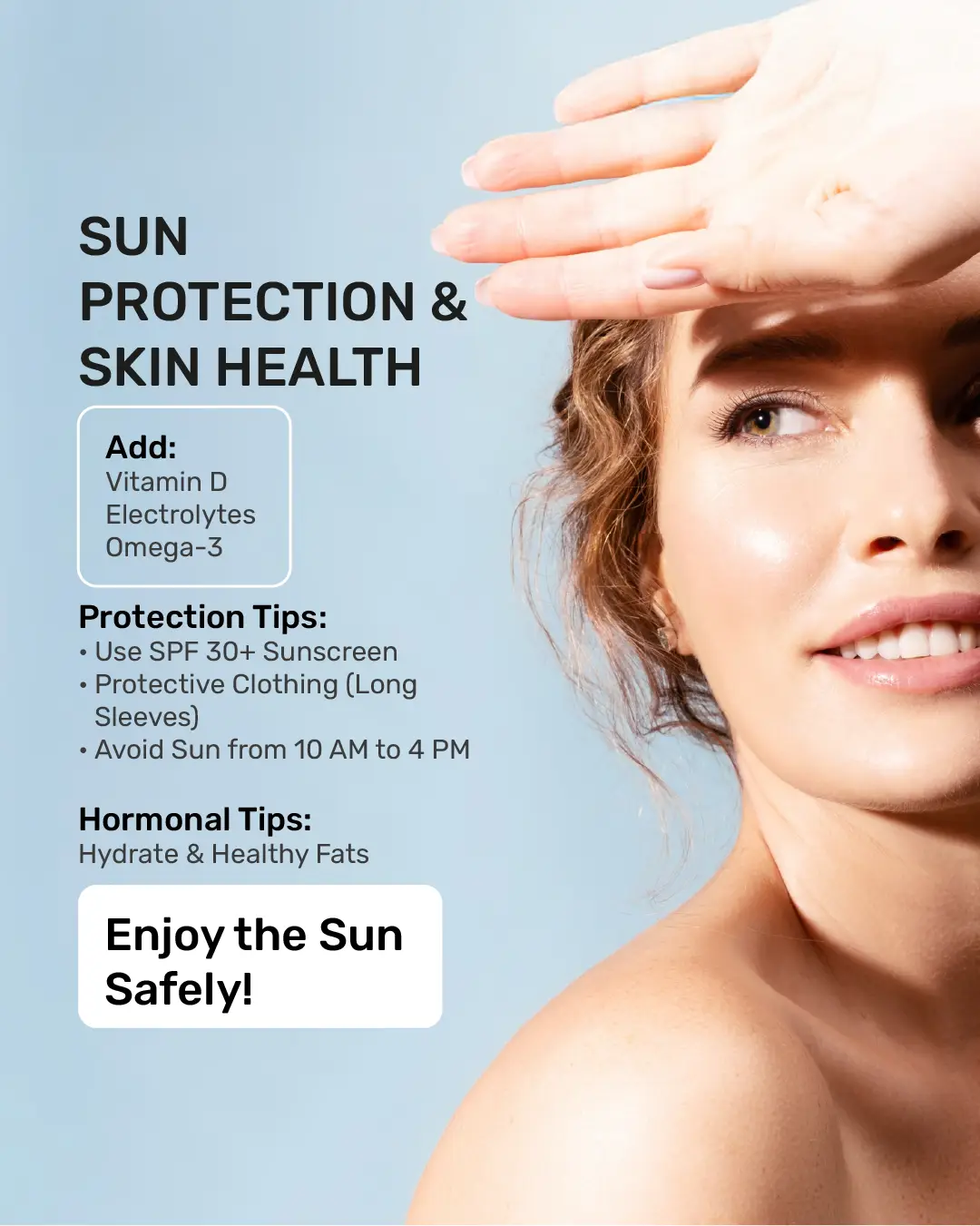Safe in the Sun: Hormones, Skin & UV Protection Tips
Introduction: Understanding the Importance of Sun Protection
Summer brings fun, sunshine, and outdoor activities, but it also presents a risk to our skin’s health due to increased exposure to UV light. As much as we enjoy the warm weather, it’s crucial to understand how hormonal imbalances and skin health are connected to UV exposure. In addition to sunscreen, hormonal balance plays a significant role in protecting the skin from UV rays and managing skin conditions.
In honor of UV Safety Month, we will discuss how sun protection and hormones are linked, which nutrients help support skin health, and the best sun safety tips to maintain a glowing, protected complexion.
Understanding the Role of Hormones in Skin Health
Hormones play a vital role in regulating how our skin reacts to external factors like UV exposure. Whether you’re dealing with hormonal acne, dry skin, or pigmentation changes, your hormones could be influencing how your skin behaves when exposed to sunlight. Several hormones, including testosterone and estrogen, affect the skin’s ability to resist and repair damage caused by UV radiation.
Testosterone and Estrogen: How They Affect Skin Health
Both testosterone and estrogen impact the skin in different ways. Estrogen helps maintain the skin’s moisture and elasticity by promoting collagen production, which is essential for keeping the skin firm and youthful. As women approach menopause, estrogen levels decrease, leading to drier, thinner skin that is more susceptible to UV damage.
Testosterone, primarily known as a male hormone, also plays a role in women’s skin health. It affects the sebaceous glands, which produce the oil that keeps the skin hydrated. Imbalances in testosterone levels can result in either dry skin or hormonal acne, both of which can worsen with exposure to UV rays.
Thyroid Hormones: Influencing Skin Resilience
Thyroid hormones also significantly impact skin health. People with hypothyroidism (low thyroid function) often experience dry, flaky skin that is more vulnerable to the harsh effects of UV light. On the other hand, those with hyperthyroidism (high thyroid function) may have thinner skin, which is less able to defend against environmental factors like UV rays.
UV Exposure and Hormonal Changes: The Skin’s Response to Sunlight
When the skin is exposed to UV rays, it triggers a defense mechanism to protect the body from further damage. This process includes the production of melanin, the pigment responsible for tanning the skin. However, hormones and UV exposure are intricately linked in this response. For example, estrogen can increase melanin production, which is why women often experience pigmentation changes during pregnancy or with hormonal contraception.
Chronic UV exposure can disrupt the body’s hormonal balance, including elevated cortisol levels (the stress hormone), which can compromise the skin’s ability to regenerate and protect itself. Over time, this can lead to skin conditions like premature aging, sunspots, and, in severe cases, skin cancer.
Best Nutrients for Skin Protection and Healing
Hormones influence how our skin reacts to UV exposure, but the right nutrients can also play a significant role in skin protection from UV rays. Here are the best nutrients to support skin health and protect against the damaging effects of the sun:
Zinc: Natural Sunscreen
Zinc is a powerful nutrient that protects the skin from UV damage by absorbing and scattering UV radiation. It also plays a key role in collagen production and skin regeneration. Zinc supports the skin’s healing process, making it crucial for repairing sun-damaged skin. It acts as a natural barrier, helping to shield the skin from harmful rays and reduce inflammation.
Vitamin C: A Shield Against UV Damage
Vitamin C is another vital antioxidant that helps reduce the damage caused by UV light. It boosts collagen production, maintaining the skin’s firmness and elasticity. Additionally, vitamin C helps to neutralize free radicals, which are produced when the skin is exposed to UV rays, thus minimizing oxidative stress and skin aging.
Collagen: The Skin’s Regeneration Protein
Collagen is the most abundant protein in the skin and plays a central role in maintaining its structure. As we age, collagen production naturally declines, and sun exposure can speed up this process. Supplementing with collagen helps to repair UV-damaged skin and improve its elasticity and strength. Collagen not only helps in skin regeneration but also protects the skin from sunburn and other forms of UV damage.
Sun Protection Tips for Hormonal Health
The most effective way to protect your skin from the sun is to use proper sun safety practices. Here are some essential sun protection tips that can benefit both your skin and hormones:
1. Use Sunscreen with High SPF
One of the most crucial steps in sun protection is the regular application of sunscreen. Choose a broad-spectrum sunscreen with at least SPF 30 or higher, as this will block both UVA and UVB rays. Apply sunscreen generously to all exposed skin areas, including the face, neck, and ears. Reapply sunscreen every two hours, or more often if you’re swimming or sweating.
2. Wear Long-Sleeved Shirts and Protective Clothing
Protective clothing is an excellent way to minimize exposure to harmful UV rays. Wearing long-sleeved shirts, hats, and UV-protective clothing can keep your skin safe while still allowing you to enjoy outdoor activities. Many clothing brands now offer clothing with a UV protection factor (UPF), which is rated to block out UV rays.
3. Avoid Sun Exposure During Peak Hours
The sun is strongest between 10 AM and 4 PM, making this the most dangerous time for UV exposure. If you need to be outside, seek shade whenever possible and wear UV-protective clothing and sunscreen. Reducing exposure during these peak hours can dramatically lower your risk of sunburn and long-term skin damage.

Lifestyle Tips for Skin and Hormonal Balance
In addition to using sunscreen and wearing protective clothing, there are other lifestyle habits that can support both your hormones and UV protection. Here’s what you can do:
1. Stay Hydrated
Drinking plenty of water is essential for maintaining skin hydration, especially during the summer. When you’re exposed to the sun, your skin loses moisture, which can lead to dry skin. Hydrating helps replenish moisture in the skin, improving its resilience and ability to protect against UV rays.
2. Healthy Fats for Hormonal Balance
Incorporating healthy fats, such as those from omega-3 fatty acids found in fish, flaxseeds, and walnuts, can help support your hormones. These fats are also essential for maintaining skin hydration and elasticity. They provide the building blocks necessary for hormone production, which is crucial for overall skin health.
3. Regular Exercise
Regular physical activity improves blood circulation, which in turn helps deliver nutrients to the skin. Exercise also helps regulate cortisol levels, reducing the harmful effects of stress on your skin. The more balanced your hormones, the better your skin will respond to UV exposure.
Integrating Functional Medicine for Skin Protection
Functional medicine focuses on treating the root causes of health issues by looking at the whole body. It’s a great approach for those experiencing hormonal acne or other skin conditions that are related to hormonal imbalances. By working with a functional medicine practitioner, you can create a personalized plan that combines diet, supplements, and lifestyle changes to promote skin protection from UV rays and overall health.
Conclusion: Protect Your Skin and Hormones This Summer
Protecting your skin from UV damage is essential, especially when hormonal imbalances may make it more vulnerable. By combining proper sun protection, collagen-rich foods, vitamin C, and zinc, along with a healthy lifestyle, you can enjoy the summer while keeping your skin healthy and your hormones balanced.
At Hormona Vida, we specialize in personalized support to help you maintain hormonal balance and skin health. If you’re struggling with skin issues like dry skin, hormonal acne, or other skin concerns, schedule a consultation today. Let us help you take control of your skin’s health with expert guidance.




